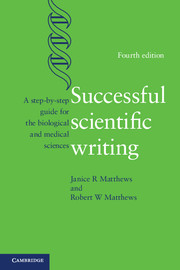Book contents
- Frontmatter
- Contents
- Preface to the fourth edition
- 1 Start with a plan
- 2 Conduct a comprehensive literature search
- 3 Prepare for the challenge
- 4 Begin well
- 5 Compose the IMRAD core of a strong first draft
- 6 Assemble the rest of the first draft
- 7 Compile tables to develop, clarify, and support your story
- 8 Include figures for evidence, efficiency, or emphasis
- 9 Report numbers clearly and responsibly
- 10 Revise for coherence
- 11 Improve style and syntax
- 12 Improve word choice
- 13 Attend to punctuation, capitalization, and other mechanics
- 14 Address your ethical and legal responsibilities
- 15 Oral presentations: adapt the text and visuals
- 16 Share your story in public: presenting talks and posters
- 17 Publication: the rest of the story
- Thirty exercises to improve anyone’s scientific writing skills
- Selected resources
- Index
14 - Address your ethical and legal responsibilities
Published online by Cambridge University Press: 05 November 2014
- Frontmatter
- Contents
- Preface to the fourth edition
- 1 Start with a plan
- 2 Conduct a comprehensive literature search
- 3 Prepare for the challenge
- 4 Begin well
- 5 Compose the IMRAD core of a strong first draft
- 6 Assemble the rest of the first draft
- 7 Compile tables to develop, clarify, and support your story
- 8 Include figures for evidence, efficiency, or emphasis
- 9 Report numbers clearly and responsibly
- 10 Revise for coherence
- 11 Improve style and syntax
- 12 Improve word choice
- 13 Attend to punctuation, capitalization, and other mechanics
- 14 Address your ethical and legal responsibilities
- 15 Oral presentations: adapt the text and visuals
- 16 Share your story in public: presenting talks and posters
- 17 Publication: the rest of the story
- Thirty exercises to improve anyone’s scientific writing skills
- Selected resources
- Index
Summary
In law a man is guilty when he violates the rights of others.
In ethics he is guilty if he only thinks of doing so.
immanuel kantIntegrity in the conduct and reporting of scientific research is a broad subject with many aspects. (Thought-provoking overviews include Buranon and Roy, 1999; Emanuel et al., 2003; Lipson, 2004; Shamoo and Resnik, 2009; and Macrina, 2014.) This chapter includes some essential basic aspects, but we are not legal experts. When you have important legal questions, particularly about such things as trade names, copyrights, and patents, consult a lawyer.
Value ethical concerns
Ethics refers to the choices we make that affect others for good or ill. Obviously, this is an enormous multifaceted topic, the subject of entire religions and philosophies. Literally thousands of publications have been written on the subject of scientific ethics and both proper and improper scientific conduct.
Do they make any difference? Every month, it seems, one can find reports of scientists forging, faking, or plagiarizing their way to success. It is difficult to assess whether scientific dishonesty is on the rise, or simply being reported more widely in our shrinking world. However, it is interesting to note that as a condition of funding, the National Institutes of Health now requires all investigators to receive training in clinical research ethics.
The historical, political, and social contexts of these issues are beyond the scope of this book, but they make interesting reading. Good places to start include LaFollette (1992), Buranen and Roy (1999), and the many references included in both. For an informative examination of how various aspects of scientific integrity are defined, why and how ethical breaches occur, and how they are detected, see D’Angelo (2012).
- Type
- Chapter
- Information
- Successful Scientific WritingA Step-by-Step Guide for the Biological and Medical Sciences, pp. 187 - 203Publisher: Cambridge University PressPrint publication year: 2014



